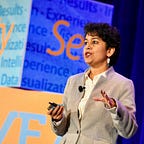Is programming a must for applying Data Science?
Do you need to be able to code in R, Python, or any other programming language to put Data Science to work for you? The answer is NO!
As part of the Aryng academy, I had a quick chat with Patrick, who is currently working as a sales operations team lead at a B2B service company. Of all his job responsibilities, Patrick loves the part where he gets to use data and charts using Looker and Salesforce for targeting, segmentation, and other sales strategies.
A few months ago, he started preparing for a career in Data Science by enrolling in free courses on Udemy, Coursera, and Code Academy. He also picked up some preliminary SQL skills. Feeling that he was a bit more prepared, Patrick took Aryng’s Analytics Aptitude Test to explore how we can help him transition to a Data Science career.
I recommended Aryng ACCA Citizen Analyst professional certification to Patrick, which involves gaining basic skills in Data Science. This is done using simpler methodologies like correlation analysis leveraging BADIR, our proprietary data to decisions framework. Simple business analysis tools like Microsoft Excel is used in conjunction with BADIR framework to drive significant business impact. The ACCA program also includes working on a live project as part of the student’s workflow following the course work. We act as a mentor in the project.
So, the ACCA certification doesn’t require any programming, and yet after the completion of the program, Patrick would be able to acquire skills that will help him solve 80% of the most common business problems. He can then transition to a sales analyst job if he chooses to, which could be done within his own company or even externally. Typically, as part of his new job, he would need to access aggregated ‘SMALL’ dataset via a GUI-based tool like Looker or Tableau and won’t really have to use SQL. Nonetheless, SQL is a good skill to have in your back pocket.
He can, however, choose to not end his journey here. After being ACCA certified, if he wants to go further and become a Data Scientist, he can enroll in Aryng’s Predictive Analytics and Machine Learning course. This way he would be able to leverage BADIR and use R and Python to execute regression, decision tree, text analytics, clustering, neural networks, etc. These advanced skills would help him solve the rest of 5–20% of the business problems. Typically, these advanced algorithms work with log level, event level, or customer level ‘BIG’ data and thus require programming/statistical tools to prepare the data and implement the algorithms.
In fact, we too rely a lot on using simpler methodologies. During my discussion with Patrick, I shared the same fact with him: even though we are a Data Science team fully equipped with the entire range of Data Science skills, we still often use simpler methodologies for our clients because it is often faster and is all that is needed for the project.
Patrick was surprised as well as delighted to find out that he can become a full-fledged analyst without learning to program. Moreover, if you look at Fortune 50 tech companies such as Google or Facebook, you would find that there are roles like product analysts, marketing analysts, sales analysts, etc., who fit the profile of citizen analysts. Then, they have Data Scientists or Machine Learning research teams, who fit the more advanced Data Scientist profiles we have mentioned above.
So don’t let the big hullabaloo around Data Science and more complex AI-laden algorithms lead you astray. Pick up essential citizen analyst skills, and you will know by the end of your first live project where your passion and your strength lie.
All the best.
